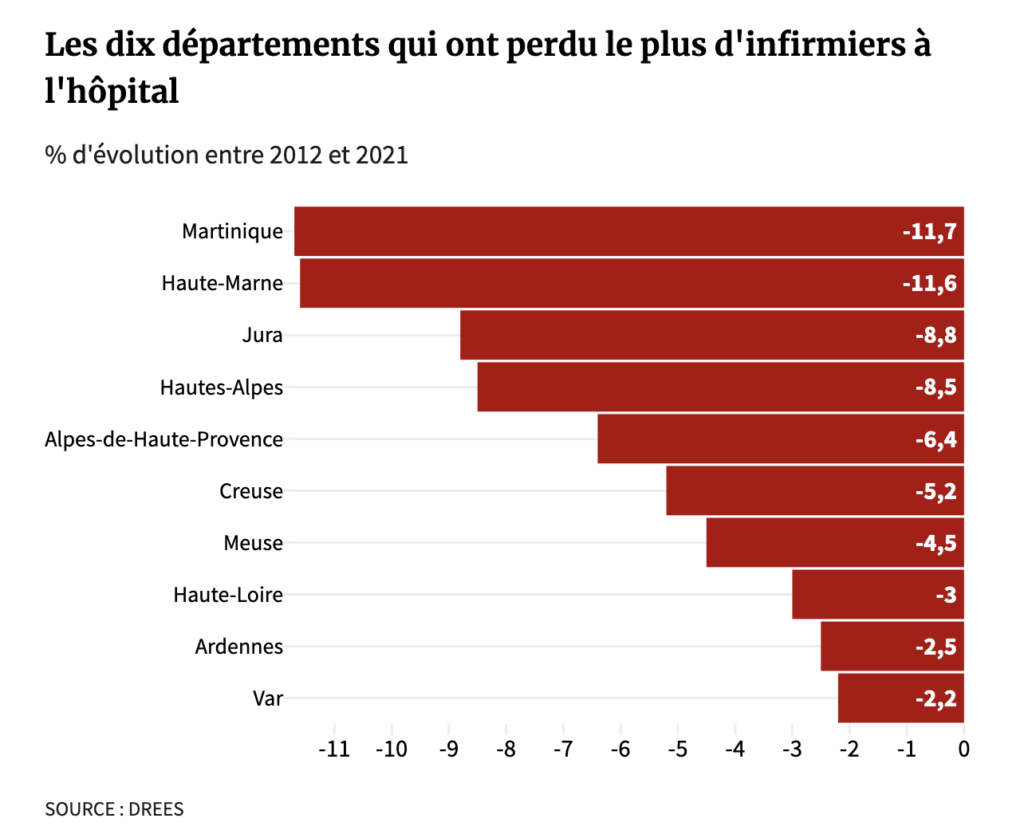The shortage of healthcare workers in France: causes and consequences

France, renowned for its high-quality healthcare system, is facing a major challenge: a shortage of healthcare professionals. This crisis, which has been growing steadily over the years and has been accentuated by the 2019 health crisis, is jeopardizing the healthcare system’s ability to provide adequate care.
According to a study published in “The Lancet”, France has an average of 336.5 caregivers per 10,000 inhabitants. By way of comparison, the Western European average is 407 carers per 10,000 inhabitants.
There is also a difference within the national territory, with some regions much more affected by a shortage of caregivers than others.

It is therefore essential to identify the causes and impacts on our healthcare system, as well as potential remedial measures.
The causes
An aging population
According to the French High Commissioner for Planning, over the next ten years, the number of French men and women aged 75 to 84 will increase by 50% between 2020 and 2030, from 4.1 million to 6.1 million.
Longer life expectancy means greater demand for healthcare. This demographic trend, combined with the fact that a significant proportion of healthcare professionals are reaching retirement age, is exacerbating the shortage of caregivers.
The sector's lack of appeal
Healthcare jobs can be demanding, stressful and sometimes underpaid. The lack of attractiveness of certain professions is leading to a drop in the number of applicants for health training courses.
According to a study by DREES (Direction de la Recherche, des Études, de l’Évaluation et des Statistiques). The number of enrollees in aide-soignant training has fallen for the second year running (-6% between 2016 and 2018), and the annual number of candidates taking the selection tests for entry to aide-soignant training is falling even more sharply. In 2018, 64,500 candidates took these selection tests, compared with 111,100 in 2014, a 42% drop in four years.
Difficult working conditions
Healthcare staff are often faced with heavy workloads, irregular schedules and constant pressure to deliver quality care. This can lead to burnout and disinterest in the profession.
According to an FHF survey entitled “How to take care of healthcare professionals”, 89% of respondents consider that their work generates stress. 67% of this stress is generated by a lack of human and material resources, 63% by overwork and task interruptions, and 35% by professional tensions with colleagues or superiors.
An aging population, a lack of attractiveness and difficult working conditions – what are the consequences?
The consequences
Overcrowded emergency services
Since their creation in the mid-1960s, emergency departments have experienced sustained and steady growth in activity, with an estimated 3.5% annual increase in patient numbers.
What’s more, understaffing in hospitals and clinics is creating saturation in emergency departments, leading to longer waiting times and lower quality of care.
The emergency department also noticed that many people were going there when their health situation did not require it. According to a survey on the healthcare system carried out in the first quarter of 2019, more than one in four French people say they have been to the emergency room in the past year (29%). And more than four out of ten admit to having used the emergency services for inadequate reasons: difficulty in obtaining an appointment with a doctor, ease of carrying out any additional tests on the spot, etc. In all, 42% of French people have already used emergency services when their health situation did not really require it.
To remedy this, the French Ministry of Health is increasingly recommending that you call 15 if you have a health problem that requires rapid medical advice. The 15 is increasingly able to provide a response for necessary care within 48 hours. This helps to relieve some of the congestion in emergency departments, which can then concentrate on real life-threatening emergencies.

Difficulties accessing care
In some rural or disadvantaged areas, the shortage of healthcare providers can make access to medical services difficult, forcing patients to travel long distances for basic care.
According to a survey by the Fédération de l’hospitalisation privée, 49% of French people living in rural areas say they have difficulty finding a doctor, compared with just 14% of city-dwellers in the Paris region.
This phenomenon is due in part to the ageing of the medical profession and the declining attractiveness of general practice, which is reflected in a drop in the number of medical students.
The Ministry of Health is working hard to combat medical deserts by implementing a number of measures. It aims to encourage healthcare professionals to settle in these areas by offering student grants in exchange for their commitment to practice there. In addition, internships in general medicine are being developed to promote this specialty and generate interest in working in these regions. Finally, to ensure remote medical care, the Ministry is deploying telemedicine and telecare.
Increased workload
Working carers often have to fill the gaps caused by staff shortages, which in turn increases their workload. This burden leads to suffering, and many caregivers resign due to the difficult working conditions.
According to Thierry Amourroux, spokesman for the Syndicat national des professionnels infirmiers (SNPI), in autumn 2019 there were fewer than 10,000 nursing vacancies (out of 700,000), today there are 60,000, six times as many. Of those who remain, 10% are on sick leave, burnout or depression.
Today, a number of associations have sprung up to help caregivers, such as SPS, which offers a national 24/7 listening platform dedicated to healthcare professionals, accessible via a toll-free number and an app.
Conclusion
The shortage of healthcare professionals in France represents a major challenge for the healthcare system. To preserve the quality of care and guarantee access to medical services for all, it is essential to act quickly and in a concerted manner. By investing in training, improving working conditions and exploring new approaches, France can hope to overcome this crisis and keep its healthcare system living up to its reputation. However, this requires the ongoing commitment and cooperation of all players in the healthcare sector and the relevant authorities.
Suggestions

How do e-learning and entertainment enhance the patient experience in hospitals?
E-learning and entertainment enrich patients’ hospital experience. Here’s how it works

The hospital of tomorrow: patient-centric
The hospital of tomorrow puts the patient experience at the heart of care, thanks to advances in safety, fluidity and innovation.
These pillars are redefining hospital care.

Prix Hélioscope-GMF 2024 at SantExpo
Prix Hélioscope-GMF 2024 at SantExpo At SantExpo 2024, the twenty-sixth edition of the Helioscope-GMF Awards took place on May 23,


